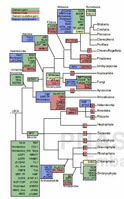Growing complexity of transcription factors enabled the evolution of living beings
A research led Iñaki Ruiz Trillo, from the Department of Genetics of the UB and the Research Institute in Biodiversity (IRBio), proves that growing complexity of transcription factors play a major role in the different unicellular-to-multicellular transitions that took place in life’s history. The research has been recently published in the journal Proceedings of the National Academy of Sciences (PNAS).
Transcription factors (TFs) are proteins that bind DNA and enhance or repress gene expression. Scientists analysed the repertoire and evolution of transcription factors in a wide variety of eukaryotic genomes (living beings whose cells have nucleus): plants, animals, fungi, and a wide diversity of unicellular organisms, like unicellular algae, or other types of protists like amoebas.
